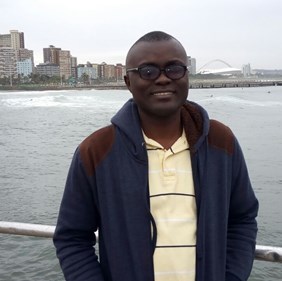Meet the Editor: Emmanuel Effa
Thursday, 01 Jun 2017 In this 10th instalment of the 'Meet the Editor' feature, we talk with Cochrane Infectious Diseases Group (CIDG) Editor Emmanuel Effa. His current position is Senior Research Associate with Cochrane Nigeria, where he co-ordinates training as part of the Cochrane Trainers Network and oversees the Branch's mentoring programme. He is also a member of Guideline International Network’s Low and Middle Income Countries working group. He is an experienced Cochrane author across four different groups, and is also an Editor with the Cochrane Kidney and Transplant Group. He has experience in clinical audits, priority setting, and systematic reviews.
In this 10th instalment of the 'Meet the Editor' feature, we talk with Cochrane Infectious Diseases Group (CIDG) Editor Emmanuel Effa. His current position is Senior Research Associate with Cochrane Nigeria, where he co-ordinates training as part of the Cochrane Trainers Network and oversees the Branch's mentoring programme. He is also a member of Guideline International Network’s Low and Middle Income Countries working group. He is an experienced Cochrane author across four different groups, and is also an Editor with the Cochrane Kidney and Transplant Group. He has experience in clinical audits, priority setting, and systematic reviews.
Could you describe where you currently work and what you do there?
I currently work as a Senior Lecturer in Internal Medicine at the College of Medical Sciences of the University of Calabar, Nigeria. In addition, I serve as honorary Consultant Nephrologist to the University of Calabar Teaching Hospital. Presently, I am the acting head of Internal medicine at the same university. As a lecturer, I teach medical students and organize tutorials on several aspects of kidney diseases. As a clinical teacher and supervisor, I run kidney care clinics, care for patients on the wards, and take on some clinical bedside teaching for students and resident doctors in training. These are in addition to a range of statutory administrative responsibilities as Head of Internal Medicine. Finally, I coordinate trainings in systematic reviews at Cochrane Nigeria at hospital where I consult.
What is a typical day for you?
My typical work day starts at 8 am with clinical seminar, then ward rounds or clinic, a teaching session, and then some administrative duties. In between are meetings on some days. I must confess, some weeks are spent attending meetings, meetings, and more meetings! Some clinical, some administrative, some research-based. Some face-to-face, some online!
What prompted you to work in this area?
I live and work in an environment where health resources are scarce, access to care…. any care at all…. is poor and policies are largely dictated, understandably so by external funders. Health information is so poor I imagined this contributed to the very high mortality and morbidity in my region. Providing convincing evidence for a lot of cost effective interventions including those that promote access to cheap and affordable care has underpinned my involvement with Cochrane.
What are the major challenges that still remain in your field?
Engaging with policy makers in Nigeria has been a tremendous challenge. Frequent changes in healthcare leadership has not served our purpose well enough. Hopefully, things will change in the nearest future.
How did you first hear about Cochrane?
I first heard about Cochrane in my second year as a resident doctor back in 2003 during a workshop on Evidence based medicine (EBM) and systematic reviews at the hospital where I worked. Before then, these concepts were still quite fluid in my mind.
What is the most rewarding aspect of being involved with Cochrane?
Building friendships and sustainable partnerships.
Who (or what) has been the biggest influence on your career to date?
Having the skills for research synthesis and the trainings that have prepared me for this have greatly influenced my career. Of course, I have been mentored in this direction by Professor Martin Meremikwu (Director Cochrane, Nigeria) since I graduated from medical school.
Please list three words you would associate with Cochrane.
Quality, commitment, mentoring.
What do you do in your spare time?
Much of my spare time is my ‘bond time’ with my wife and three children. I take them out so we all laugh and play at some leisure spots. The other little bit is now being taken up by cycling, a hobby I recently signed up for!
The CIDG editorial base is located at the Liverpool School of Tropical Medicine in Liverpool, UK. The CIDG is led by Professor Paul Garner (Co-ordinating Editor) and Anne-Marie Stephani (Managing Editor). Over 600 authors from some 52 countries contribute to the preparation of the Cochrane Reviews. They are supported by an international team of Editors, each with topic or methodological expertise.
The CIDG’s main areas of work are on determination of the effects of interventions on the prevention or treatment infectious diseases of relevance to the United Nations Sustainable Development Goals, particularly malaria, tuberculosis, HIV/AIDS, and neglected tropical diseases. The aims of the CIDG are to impact on policy and research in tropical diseases through the production of high quality and relevant systematic reviews, and to lead developments in review quality improvement and effective dissemination of findings.
Tag Cloud
